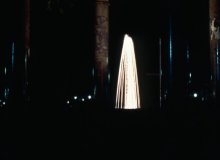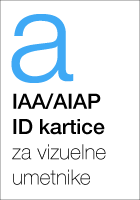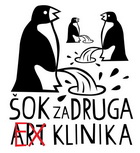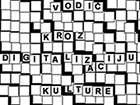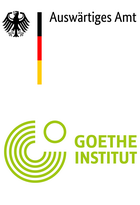Novi Sad - European Capital of Culture
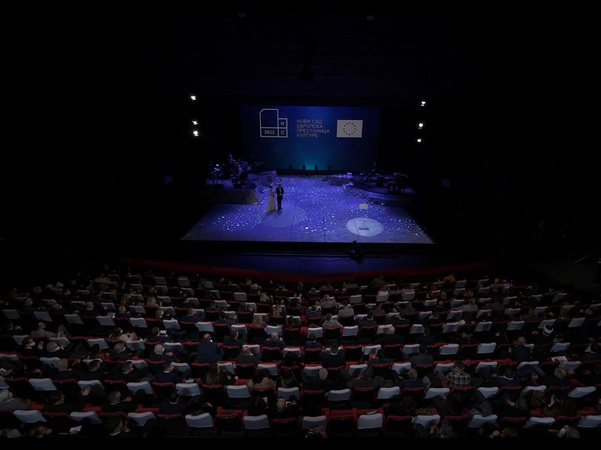
Novi Sad has become one of the three European Capitals of Culture in 2022 - a year after the original plan, which was postponed in 2021 due to a pandemic. The program of Novi Sad as the European Capital of Culture was presented on January 13 at the Serbian National Theater in front of guests from public and cultural sphere, with expressions of satisfaction from government officials on the successful completion of years of preparations for a city outside the EU to become an ECOC for the first time, as well as messages from European Commission officials about Serbia's perspective in the EU and the importance of culture in that context.
The Head of the EU Delegation to Serbia, Emanuele Giaufret, presented a plaque to the Mayor of Novi Sad, Milos Vucevic, making Novi Sad the official European Capital of Culture, along with Esh in Luxembourg and Kaunas in Lithuania.
The importance of the Novi Sad ECOC title was emphasized at the ceremony by Prime Minister Ana Brnabic, Minister of Culture and Information Maja Gojkovic and Director of the Novi Sad 2022 - ECOC Foundation Nemanja Milenkovic, as well as EU Commissioner for Innovation, Research, Culture, Education and Youth Mariya Gabriel who spoke via a video link.
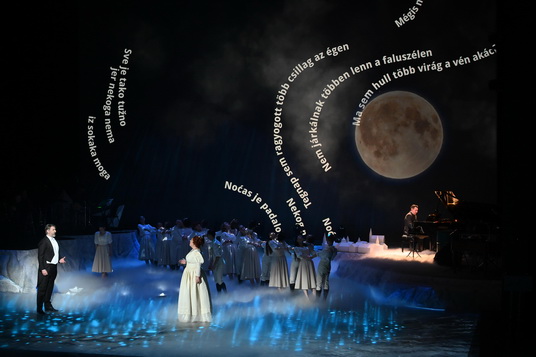
Photo: Goran Zlatković
Prime Minister Ana Brnabic pointed out that there is no city that deserved to raise the European flag of youth and culture more than Novi Sad, because it is the center of "creativity and culture, excellence and innovation".
Emphasizing the importance of creative industries for several times, Ana Brnabic stated that "large foreign technology companies, research and development centers are flourishing" in Novi Sad today, as well as domestic "smart companies".
Noting that great effort was invested in the candidacy of Novi Sad for the ECOC, Ana Brnabic said that behind that success is a great and dedicated team work of the Foundation "Novi Sad 2022 - ECOC" and the City of Novi Sad, with the support of the provincial and national governments. Not failing to mention Serbian President Aleksandar Vucic, Ana Brnabic said that when she became Prime Minister, she inherited a fiscally and macro-economically stable country from Vucic - the former Prime Minister. After that, it was necessary to think about how Serbia can present itself as a winner at the international level, and as it was concluded - the only way to do that was strategic investment in innovative initiatives and artists, as well as in building spaces where these people would gather. In that context, she mentioned the attraction of research and development centers in Novi Sad, the construction of a network of science parks in Belgrade, Novi Sad, Nis and Cacak, the establishment of the Science Fund, the Institute for Artificial Intelligence Research, and the reconstruction and revitalization of Novi Sad's Chinatown. She also pointed out that, after more than a decade, the National Museum and the Museum of Contemporary Art in Belgrade, as well as the National Theater in Vranje, were reconstructed and reopened, and that the construction of a new concert hall in Belgrade and the construction and renovation of the Faculty of Music, Fine Arts and Applied Arts were initiated. Following the example of the Chinatown in Novi Sad, the transformation of the Old Fireplace in Belgrade into a multifunctional center, creative and innovative center, has begun.
As an indicator of the importance of investing in culture, she is especially proud of the loan that was taken for these purposes for the first time in Serbia from the Council of Europe Development Bank.
Ana Brnabis also emphasized that the budget for the film has increased in the past ten years from around 200,000 (2012) to as much as 21.9 million euros (2021). "Today we are witnessing an explosion of film and audio-visual production. More than 20 domestic films and series, including animated ones, are being filmed at the same time", but the entire production is being done in Serbia, which, as she stated, was a dream.

Photo: Goran Zlatković
The Prime Minister also pointed out that the creative industries have achieved a growth of 60 percent in the last six years, and that they make up 7.4 percent of GDP. The export of creative industries has increased by 51 percent since 2014, and more than half of the employees are young, said Ana Brnabic and pointed out that more than a billion euros of investments in the last five years were directed to creative industries, mostly in software development, video games and cinematography. Novi Sad stands out in that respect as well, added Ana Brnabic.
Following the example of the concept of the European Capital of Culture, as she pointed out, the project "National Capital of Culture" was launched, and Cacak has recently taken that title.
"The idea is that today and in the future in Serbia, our writers, musicians, painters, designers, architects, sculptors, directors, playwrights, actors, scientists and innovators can live a dignifying life as they work, have a strong platform for their country to go to European and world scenes and markets", said Ana Brnabic, not mentioning the budget for culture, which has been the subject of criticism for years by the actors of the cultural scene as one of the lowest in Europe in relation to the overall state account.
The Minister of Culture and Information, Maja Gojkovic, who is also the Deputy Prime Minister of Serbia and the former mayor of Novi Sad, pointed out that it is a city that has always been an environment that symbolizes European cultural values. "In Novi Sad, differences have never been a reason for division, but bridges that connect and unite", said Maja Gojkovic and reminded that back in 2008, as the mayor of Novi Sad, she sent a letter to the European Commission asking whether a city outside the EU can run for ECOC.
"It turned out that every fear was superfluous and that Serbian Athens is worthy of great recognition, one of the creators of which is Melina Mercury, a famous Greek actress and Minister of Culture", said Maja Gojkovic and expressed confidence that Novi Sad in 2022 will succeed to present to Europe what "makes it specific and unique".
"As a city on the Danube with a rich history, the center of various festivals and cultural events, a place of linguistic and cultural diversity and nothing less than an environment in which traditional and modern, local and global, classical and avantgarde intertwine. Its own and special, and at the same time open, cosmopolitan and city of all those who come to visit it", added Maja Gojkovic.
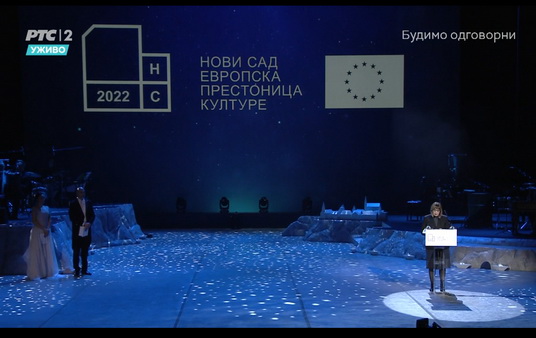
The importance of the Novi Sad ECOC title was also emphasized by the head of the EU Delegation to Serbia, Emanuele Giaufret, stating that Novi Sad is of great importance both for the Serbian national identity and for Europe.
"Novi Sad has always been a beacon of freedom, openness, ethnic, cultural and religious tolerance - values that are so necessary today, which all of us Europeans should nurture and maintain. With their extremely rich cultural diversity, museums and galleries, universities and institutes, great national theaters, their festivals like Exit, they make the city and the whole country a cultural stronghold in Europe, encourage positive change and nurture democratic values in society", said Giaufret.
"Europe is counting on you - to be a beacon of culture, openness and tolerance," said the EU ambassador.
European Commissioner for Innovation, Research, Culture, Education and Youth Mariya Gabriel congratulated Novi Sad on the ECOC title and pointed out that “the whole of Europe is joining it in celebrating culture”.
"Today you are writing history, together we are sending a message of hope and openness. Strengthening the ties that connect Europe paves the way for a more ambitious future of the Western Balkans in the EU", she said, noting that since the 1980s, European cities have been "tirelessly exploring ways to spread culture and build trust between communities."
"Diversity is something we find again in the ECOC," said Mariya Gabriel, and expressed confidence that Novi Sad would "further push the boundaries of this initiative" with a program of more than 1,700 artists from more than 45 countries.
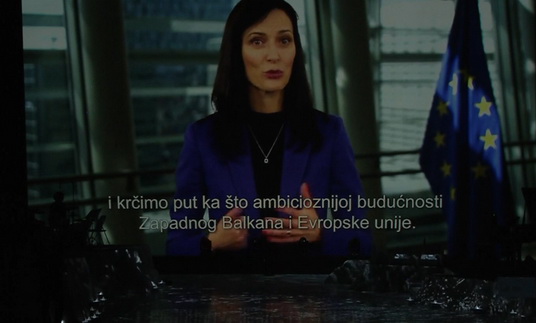
The mayor of Novi Sad, Milos Vucevic, said that during 2022 the entire Europe will see what kind of treasure Novi Sad has.
"We will show the richness and intertwining of different cultures that are a strong link between the people and the nationalities who live here. The same Novi Sad that has been multinational since its inception, which our ancestors built together with the colors of their spirituality, tradition and identity. The same Novi Sad that was called Serbian Athens, because in the 19th century it was the cultural, political and social center of the Serbian people… The same Novi Sad that shines today when the bells of six different churches ring loudly. A city where differences are recognized and respected, now represents us on the largest European cultural scene", said Vucevic, who also mentioned some problems: "We worked hard, and got nervous, and lobbied, and broke prejudices."
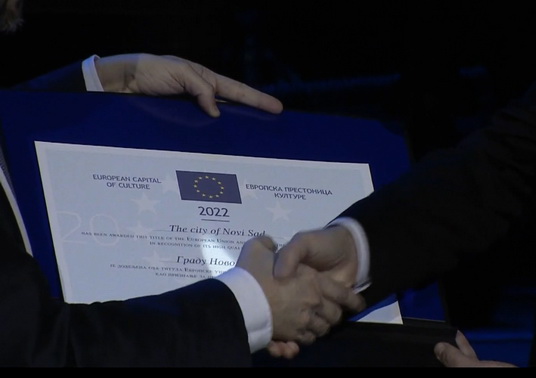
Director of the Foundation "Novi Sad 2022 - ECOC" Nemanja Milenkovic pointed out the specifics of the ECOC program, which has eight units, united under the slogan "For new bridges". The program connects local and European artists, as well as the institutional and non-institutional scene", Milenkovic added.
The central event of the opening ceremony of the ECOC program in Novi Sad was the play "Zeniteum: 2022" directed by Dragan Zivadinov from Slovenia, dedicated to Mileva Maric Einstein and Milutin Milankovic as great names in Serbian science, as well as Ljubomir Micic, founder of the avant-garde art movement Zenitism.
The program was designed within the program unit that started with the New Year's Eve 2022 and a light spectacle in honor of the great world scientist of Serbian origin Nikola Tesla.
(SEEcult.org)
Funded by the International Relief Fund for Organisations in Culture and Education 2021 of the German Federal Foreign Office, the Goethe-Institut and other partners, goethe.de/relieffund

